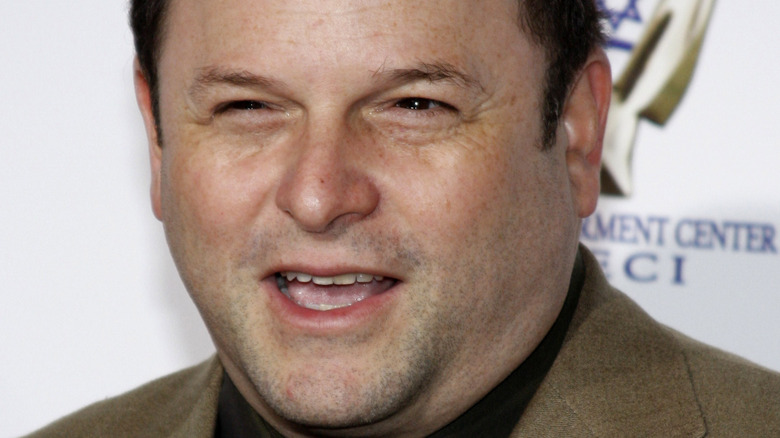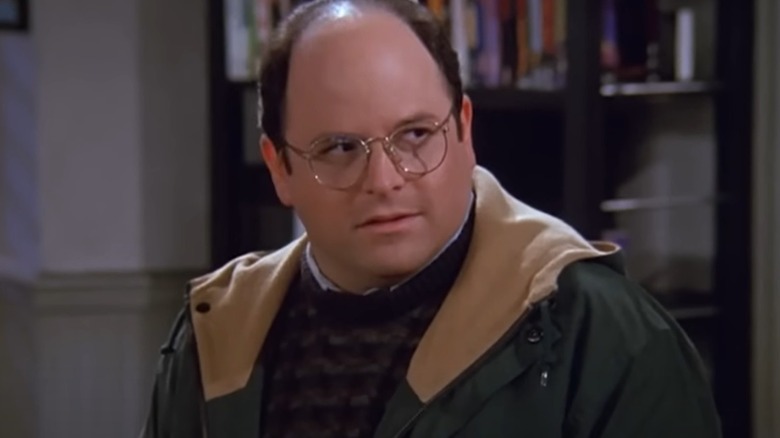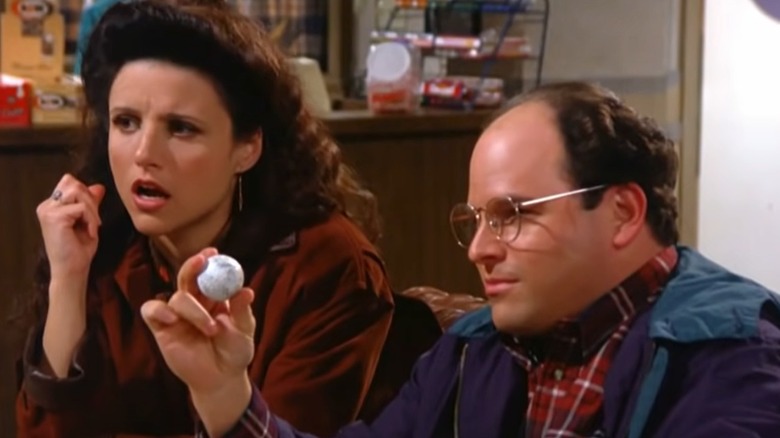Jason Alexander Once Revealed The Truth About Laugh Tracks On Seinfeld
Since its inception in 1950 by Charley Douglass (via the BBC), the laugh track has been shunned by many. There's just something about plugging recorded laughter into a scene — rather than having the real-time response of a live studio audience — that doesn't sit right with some. Actor-producer David Niven said at the time (per the BBC), "The laugh track is the single greatest affront to public intelligence I know of, and it will never be foisted on any audience of a show I have some say about."
However, the laugh track was — and continues to be — "foisted" onto TV sitcoms (via IMDB). Examples include "Friends," "The King of Queens," "The Big Bang Theory," and "Seinfeld." Yes, even a show created by popular comedians Jerry Seinfeld and Larry David utilized the art of canned laughter on a regular basis. Given the fact that "Seinfeld" was largely taped in front of a live studio audience (via Esquire), one might wonder why they felt the need to use a laugh track. It wasn't for lack of funny content — over two decades later, the show is still being hailed as one of the top sitcoms of all time (via Rolling Stone). From the group's battle with the Soup Nazi (Larry Thomas) to the flailing dance moves of Elaine Benes (Julia Louis-Dreyfus) and the various antics of Kramer (Michael Richards), "Seinfeld" is chock-full of laughter-inducing moments.
For anyone wondering about the reason behind the laugh track, Jason Alexander, who portrays fan-favorite George Costanza, revealed the truth.
Seinfeld used a laugh track for editing purposes
According to "Seinfeld" actor Jason Alexander, laugh tracks were used on the sitcom — but not in the way one would expect. "They would never put a laugh somewhere we didn't get one," he told Television Academy Foundation. Instead, the show's creators used it to make the organic laughter of the live studio audience sound smoother when various takes were used for the final edit.
"So the sound of the laughter in take one is different from the sound of the laughter in take two, but it's an immediate shot. So we're using Jerry's line from take one and my reaction from take two, so they would use a laugh machine to blend the organic audience laugh and not make it jump," said Alexander.
Jerry Seinfeld himself backed up Alexander's explanation in a Reddit AMA thread. He added how some scenes were filmed in front of an audience, and others weren't, leading to more difficulties in the laughter flow. Still, instead of inserting the sound of roaring laughter into those latter scenes, a different approach was taken.
"[W]e tried to compromise and put in a subtle laugh track," said Seinfeld, who isn't completely opposed to Charley Douglass' invention. "I think that one of the fun things of a sitcom is feeling like you're in an audience even though you're home, watching it by yourself. I have to say I like some sitcoms with them and some without. Depends on the show."
Seinfeld's creators took live audience laughter (or lack thereof) seriously
In his Television Academy Foundation discussion, Jason Alexander shared how important inciting laughs from the studio audience was for the show's creators. If an intentionally-humorous scene didn't resonate as expected, rather than insert a laugh track, the entire scene would be reworked until it got the wanted response. This, reflected Alexander, resulted in some very long nights on set. "Everyone would circle onto the set, writers, cast, and we'd start pitching ideas," he said. "How do we make this better? What do we do?"
A prime example of this is Season 5, Episode 14 ("The Marine Biologist"), when George is tasked with saving a beached whale. The final scene in the diner, when George gives his unforgettable "the sea was angry that day my friends" story, wasn't actually in the original script. At first, George's plotline wraps up when he walks into the ocean. However, the audience wasn't impressed.
Minutes after the scene flopped, Alexander was asked how quickly he could learn a page-long monologue, the one that now closes out the episode. His speech was written on stage in front of the audience, and what viewers see is the first and only take. This time, it was a hit. Alexander said, "When that golf ball comes out of my pocket, that was one of the longest sustained laughs we ever got in a live taping."


